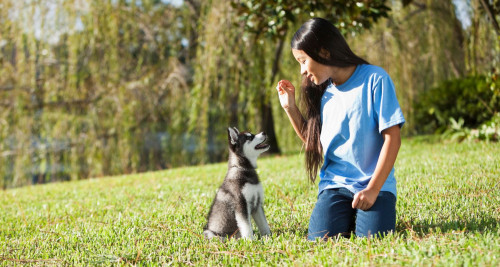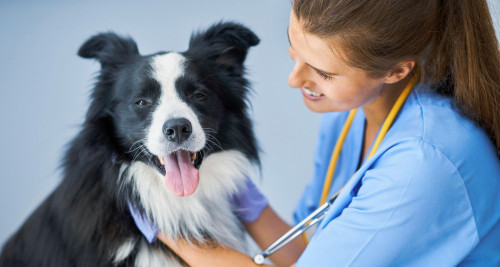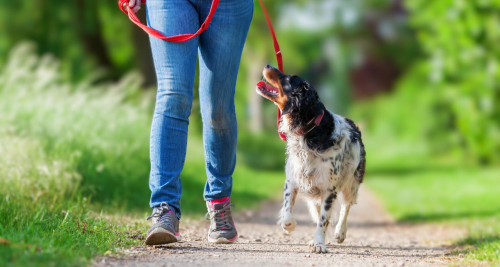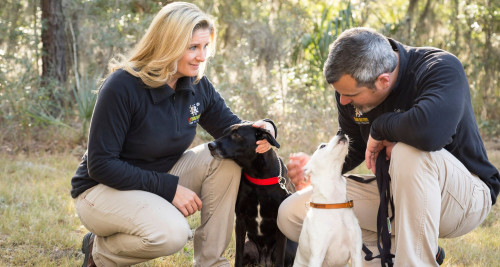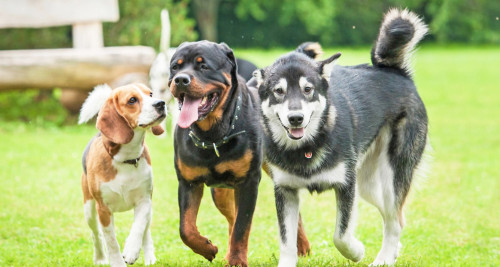The Labrador
Breed Traits and Characteristics
According to the American Kennel Club, here are some breed characteristic you can find in Labradors.
- Height
22.5-24.5 inches (male), 21.5-23.5 inches (female)
- Weight
65-80 pounds (male), 55-70 pounds (female)
- Life Expectancy
11-13 years
- Coat Type/Length
Double/Short
-
100 Affectionate with Family
-
100 Good with Young Children
-
100 Good with Other Dogs
-
100 Trainability Level
-
100 Energy Level
-
60 Barking Level
-
80 Shedding Level
-
40 Drooling Level
The Labrador
The Labrador continues to rank as a very popular breed, despite the emerging popularity of many other breeds such as designer breeds and toy-breeds for those now living in the inner city.
The Labrador still ranks as the country’s most popular dog breed in the USA and United Kingdom. Why? Because they are big and sweet and in most cases, a great family pet. However, they are also the “top dog” when it comes to needing dog training.
Bark Busters has trained more Labradors in the U.S. and Canada than any other breed but mixed breeds. Close at its heels is the Staffordshire Terrier in the United Kingdom and other countries.
Although very trainable, they do need expert training and Bark Busters has a successful track record for training Labradors of all ages and for a list of behavioral traits. Bark Busters training is the type of training that won’t suppress their gregarious personality or spoil their fun loving nature.
Dog owners nowadays understand the importance of locating kind and humane training for their pets, training that is dog friendly and fits into their time scale and training needs. Bark Busters has the Labrador ranked as #1 most trained dog in countries such as the USA, United Kingdom and Canada and still popular in Australia, New Zealand and Spain.
Labrador Breed Facts
Personality & Temperament
- They have a big heart and a zest for life.
- They are the great outdoors dog but can accept an ordered home life with the correct training.
- The AKC describes the breed as “kind, pleasant, outgoing and of a tractable nature.” Bark Busters doesn’t disagree with them.
The breed has always been looked upon as the ideal family dog that possesses a stable temperament, loving nature and kid-friendly personality.
The outgoing, generally sociable Labrador ticks a lot of boxes when it comes to selecting the ideal family dog, but you need to do your homework and make sure you select the right personality and temperament to suit your lifestyle. Don’t select the over-exuberant puppy, if you love the 'great indoors.'
Labradors are a smart breed that are constantly training their owners. They can exhibit puppy behavior for a bit longer than other breeds (I have seen 3 year old Labrador puppies) they are smart and need to be busy.
Points of Interest
- Coat repels water, they love the water
- Webbed feet, ideal for swimming
- An even, jolly temperament
- Great family dog that ticks most of the boxes for all family members
- Good reputation with children
- Energetic and athletic-great companion for the fitness loving dog owner
- Confident personalities, less prone to aggression
- Great fun dog, up for any game
- Love retrieving, often obsessively
- Have soft mouths and can pick up items without biting down hard on them
- Intelligent and easy to train with basic obedience and general commands
Unique Breed Traits
Labradors love retrieving. Be wary if this behavior becomes obsessive, so look for ways to enhance and harness this natural behavior.
Their coat repels water to help monitor body heat while in the water and they have webbed feet which are ideal for swimming, but harder to get that lather up when bathing.
The Labrador is a breed that is generally slow to mature and can be destructive for some time if not provided with sufficient entertainment or a worthwhile outlet for their intellect. So select a controlled, enriched environment for your dog that can reduce this need and make sure you provide all of your dog’s four basic needs.
The breed has a tendency to over eat and be over-weight, so monitoring and measuring good nutritious portions is important. Best not to lean towards allowing your dog to eat at will.
Selecting a Labrador Puppy
There has been an emergence over the last 20 years of two distinct types of Labradors, the Traditional Labrador; and a new style-Labrador of more recent years.
We have no facts other than our own research conducted across the 7 countries where we train, but we have definitely seen a change in the breed style in the last 20 years. We can only guess at why this has happened, but we feel that it came about when the Labrador became the go-to-breed for everything ‘detection’.
This type of work required a dog that was acceptable at airports and capable of working for long hours, a dog that was highly energetic and willing to work longer and harder, with great enthusiasm.
Although the traditional Labrador has these traits, they more than likely did not have the staying power required for this type of work. This is evident in war zones, where the heat in some cases would be unbearable and where a leaner dog would fare better.
We believe their breeding took a turn in the road to breeding a super-high energy dog that was leaner, less prone to obesity and a go-all-day type of dog when they became the most popular breed for this type of detection work. The indicator is evident in the fact that some of ‘the guide dogs for the blind’ associations are breeding their own Labradors now that are more in keeping with what we refer to as the ‘Traditional Labrador’.
The traditional Labrador has shorter legs than the new-style Labrador, more body fat and a squarer body and head, is less excitable and easier to train.
The new style Labrador has longer legs and leaner body, finer bones than the more traditional Labrador, elongated head and generally taller than the traditional Labrador, much more excitable and extremely high energy levels.
Match temperament of puppy to that of your children
If selecting a family dog, be sure to match the dog’s personality to that of your child. An over-exuberant puppy will frighten a timid or gentle-natured child, so give thought to the type of personality that will match that of your children or it can all end in tears.
New Style Labradors
are more lean and leggy, generally have finer bones and have a more elongated head, than the Traditional Labrador. If you compared the two styles, you would see that the new style is taller and longer in the body.
Adolescent Labradors
Just like any other breeds, an adolescent Labrador will test their owner, regardless of how well trained they are. It helps if you are aware of this fact and act accordingly. Its simple and easy to fix if you think leadership and balance that with affection and fair and just rules.
Training Your Labrador
Controlled Environment
To reduce the damage that a young Labrador can do to your precious things, you might want to create a safe, controlled environment. This place should be void of all your precious items and should be the place where you provide entertainment for your dog.
Child’s Play
Because the Labrador is a popular family dog, any play between a dog and children must be monitored and controlled. Children have a way of getting dogs excited and this can lead to the dog inadvertently hurting the child through their natural excitable behavior.
Make sure that you teach the children to play sensibly and instruct them to play games that are less likely to lead to over-exuberance, such as hide and seek games or fetch games, versus the rough and tumble type of games.
Rough housing will only encourage your dog to become over-excited every time it sees the children and this can cause your children to try to avoid the dog because they fear getting hurt.
Adult Play
Any form of play, ‘fetch the ball’ and especially tug-of-war games, must end with you taking control of the item. Once the game is over, take the item out of play, with a ‘Finish’ command and lots of praise.
This technique is designed to show the dog in a subtle way, that you are the decision maker and that you control the game. In other words, you are the leader of the pack.
Don’t play rough and tumble or hand games -- these only teach dogs to bite when they play and to play rough.
Encourage your Labrador to use its brain by hiding items that he can find or playing a controlled game of fetch, where you teach him to wait until he is told to go get the thrown ball.
Labrador Common Behavioral Issues
Labradors do have their behavioral issues but obsessive barking is not common to the breed. If they do have barking issues, it’s usually related to excitement, not aggression. However, Bark Busters trainers are often called in to help pet parents stop the chewing, digging and over-exuberance characteristics of the Labradors.
Although very trainable, they do need training. They are known to be tolerant of other dogs and children, but all play between dogs and a child should always be closely monitored.
It is the Labrador’s inherited attributes and the public’s perception of the breed that has led them to be excellent candidates for assistance, seeing-eye dogs, therapy, support and scent detection.
Labradors love company and get overjoyed at seeing new faces. This gets them jumping for joy while their powerful tails create a path of destruction among your furniture and knick knacks! Their bouncy, full of energy personalities are sometimes a challenge for their pet parents, but generally they are easy to train and capable of being trained to remain calm.
Energy levels
Over-exuberance is common amongst the breed and this is the #1 issue we hear from many dog-parents. Know that this breed is generally easy to train to settle and become calm. With correct training geared towards ‘canine communication’, these dogs can be taught to be calm. Although rare, this over-excited behavior can manifest itself into aggression.
Connect with Us!
Need help training your Labrador? Call 1-877-500-BARK (2275)or enter your zip code.
Labradors Have a Love of Food
The Labrador Retrievers and the Golden Retrievers are loving, compassionate, and highly motivated dogs. Labs and goldens share many common traits, one that is important is the love of food. These dogs are highly food motivated, which means that they will do anything for that food reward. It is important that we not over feed these dogs as it can result in lameness of joints and diabetes; which are all in conjunction with obesity and over feeding.
Owners of labs and retrievers also need to know that the age at which they are spayed and neutered is important, if the pet reaches sexual maturity before being fixed this will help later in life with obesity or weight gain. Females should ideally go through one to two heat cycles before being fixed, and males should be at least one year of age or older. It is important to also monitor how much food is being fed at a feeding, this over eating/feeding can be contributed to owners not measuring out how much food is being given at one time.
Most owners buy treats from the store, but beware that these treats contain high amounts of sugar, fat, and calories. There are many other treat options rather than the store bought ones. A few items that you might have in your refrigerator that you can give your pet are: carrots, green beans, apples, and watermelon. If a lab or retriever is part of a larger household or with children, it is important to explain that the pet doesn’t need treats from everyone. Instead give the pet love and affection, which we all know labs and retrievers love, this will cut down on the amount of treats. Attached below is a quick, easy, and healthy dog treat you can make right at home.
Peanut butter & pumpkin treats:
-
2 ½ cups whole wheat flour
-
2 eggs
-
1 cup canned pumpkin
-
2 tbs. peanut butter
-
½ tsp. ground cinnamon
Preheat oven to 350 degrees, whisk all the ingredients together, add water if needed to make dough workable, roll into ½ inch thick, cut with cookie cutter designs, bake on baking sheet for 40 minutes.
Many thanks to Dr. David Randall for his Tip of the Month. David is from: Big Cypress Animal Clinic 11363 Tamiami Trail East Naples, Florida 34113 Phone: 239-774-2233 Fax: 239-774-952
Labrador Health
Common Illnesses and Injuries
Your Labrador Retriever’s health concerns will change over the course of their life. A puppy might be more prone to ear infections as their immune system develops, an active 2-year-old Lab may be more likely to tear a knee ligament, and a senior Labrador is far more likely to develop arthritis or cancer as they age. Labs also have personality and physical traits that may make them more prone to certain conditions—a Labrador Retriever who loves to swim may develop an ear infection more often than a breed with a pricked ear.
At any stage of life, there are some of the most common injuries and illnesses you should be aware of when bringing home a Labrador Retriever:
- Allergies
- Vomiting and Diarrhea
- Diabetes
- Cruciate Ruptures
- Ear Infections.
- Masses
- Arthritis
- Ingestion of foreign material
If you are ever concerned about your dog’s health, your local veterinarian is a great resource—no matter how small the question.
Genetic Health Concerns
Like many popular breeds, the Lab has its fair share of hereditary based issues, like hip dysplasia and elbow dysplasia. Most reputable breeders now have their breeding stock checked and scored for these hereditary ailments by a vet. You can request proof that the puppy you are purchasing comes from parents that have been checked for these issues.
Because many other health issues are also hereditary, you should do some research on the ancestry of your puppy and any health issues of that particular breed.
Many rescue organizations also check for common-ailments before making them available for adoption.
Other Labrador Retriever health issues to watch out for:
- Allergies to things like food, grasses and pollens
- Bone and joint problems
- Cancer
- Bleeding disorders
- Diabetes
- Epilepsy
- Ear problems
- Heart disease
- Liver problems
- Thyroid disease
Some of these ailments may not be hereditary but could stem from environmental or dietary issues. Be sure that your dog is fed on a healthy diet and receives regular vet checks to ensure it always stays healthy.
Labrador Grooming
The Labrador’s short coat is easy to care for and always looks good. As a water retrieving dog, the Labrador’s coat is designed to repel water and to keep the dog warm while swimming. Think of it as a ‘wash and wear’ type coat.
Regular brushing is required and we recommend that you only bath your Labrador when absolutely necessary as their coat will naturally repel dirt and grime. Too much bathing of any dog strips the natural oils and can create that doggy smell.
Tips for Every Dog Owner
Hear from Bark Busters Clients Who Have a Labrador
Need Dog Training Assistance with Your Labrador? Find Your Local Trainer Now!
CALL TODAY 1-877-500-BARK (2275)
